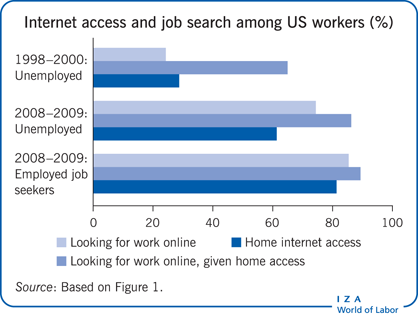Elevator pitch
Since the internet’s earliest days, firms and workers have used various online methods to advertise and find jobs. Until recently there has been little evidence that any internet-based tool has had a measurable effect on job search or recruitment outcomes. However, recent studies, and the growing use of social networking as a business tool, suggest workers and firms are at last developing ways to use the internet as an effective matchmaking tool. In addition, job boards are also emerging as important for the statistical study of labor markets, yielding useful data for firms, workers, and policymakers.

Key findings
Pros
The cost of looking for work and recruiting workers online is very low compared with traditional job search and recruiting methods.
Recent research has detected an unemployment duration reducing effect of internet job search where before no effect was detected.
People who look for jobs online are not casual “window shoppers”: They search just as actively as others who search off-line.
The advent of social networking sites as a job search tool promises to yield further improvements in labor market matching efficiency.
Electronic job boards—i.e. websites where job ads and résumés are posted—are emerging as an important source of data on labor market trends.
Cons
The low cost of applying for jobs online can result in large numbers of inappropriate applications being submitted.
Internet job boards can be dominated by large numbers of “stale” résumés.
Most previous studies have found no labor market friction-reducing effects of online job seeking.
Internet job search remains disproportionately anonymous and formal, i.e. it does not take advantage of preexisting networks of friends, relatives, or colleagues. Historically these have been the most effective search and recruitment tools.